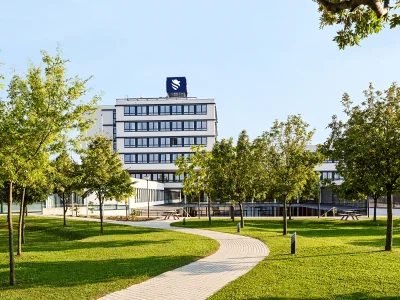
Gábor Princz
Position
Location
Campus 1 Wiener NeustadtJohannes Gutenberg-Straße 3
2700 Wiener Neustadt

Research Activities
ReMAIntAIn
ndustries with high resource consumption, such as the aluminum continuous casting industry, face major technical and economic challenges. In particular, small-batch production with a wide variety of products, numerous formulations and parameter settings can lead to a multitude of wear phenomena and defects. These causes of defects often cannot be detected by sensors and thus cannot be identified using conventional condition monitoring techniques, which leads to long troubleshooting times. Downtimes thus result in high costs and high energy consumption. As a result, companies usually keep large quantities of spare parts in stock and often replace parts that are still functional early to minimize downtime. However, this results in the waste of valuable resources. Knowledge about past failures and experience with the machine is usually only available to maintenance personnel and is often documented in maintenance and machine logs, but is rarely linked to sensor and process data. Consortium lead: Institute of Industrial Engineering and Management, Industry partner: TU Wien Institute of Management Science, Fried v. Neuman (Aluminium) Gmbh, Mesify Solutions Gmbh
DigiProTrain
This project aims to develop and offer training courses in the field of Industry 4.0 for companies in so-called learning factories. Learning Factories represent a realistic manufacturing environment suitable for education, training, and research. They are a physical learning environment containing educational instruments and equipment, effectively creating the working conditions of a real industrial site for didactic and training purposes. The Networks Development initiative has the purpose of creating an EIT Manufacturing Marketplace that offers all the Learning Factories’ education programmes and activities. Thereby increasing the outreach and access to the Learning Factories training offer, as well as incrementing the availability of equipment suitable for testing and piloting. Funded by EIT Manufacturing as part of the Learning Factory Network Development Program.
IntelliProPS
The aim of this project is (1) the research and development of new planning and control concepts based on the combination of classic methods of planning and control with methods of artificial intelligence (especially machine learning) for production scenarios with very high volatility and variability with regard to product variants, order quantities, raw material/part quality, with a simultaneous high degree of automation and a high degree of human-machine collaboration, (2) the development of a configurable simulator and demonstrator that allows production companies to use various decentralized planning and control concepts enriched with AI for production scenarios with high variability and To test, evaluate and further develop volatility in terms of product variants, order quantities, raw material/part quality (development and test bench for AI-enhanced production planning and control concepts). This project is funded by the FFG as part of the COIN construction FH for the economy program.
